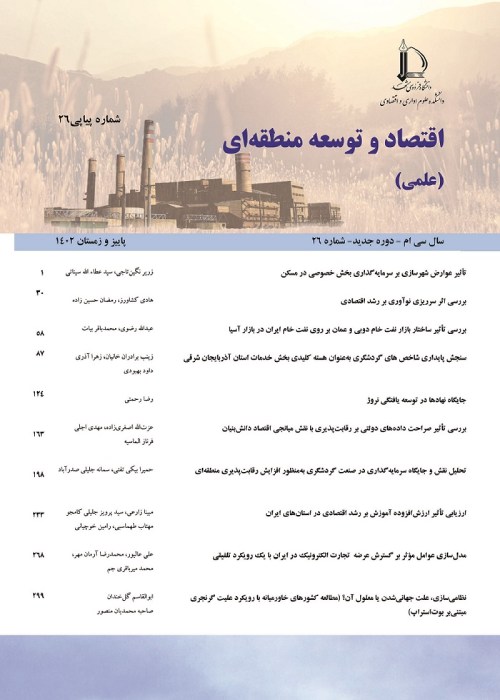Energy consumption and value added growth in different sectors of Iran: Co- integration and Multivariate Panel Error Correction approach
Author(s):
Abstract:
Energy is the basic element of economic development process. It is driving wheel of the world’s global economy and the foundation of developed countries. It greatly contributes to human and economic growth and wellbeing of the society. Developed countries use huge amounts of energy for industries, services, housing and transportation. The linkage between energy consumption and economic growth has been a challengeable topic in economic studies after 1970s crisis. All studies about this relationship that initiated after Kraft and Kraft (1978) during three decade try to find this linkage but after more than three decades of empirical research, still unanswered. Nowadays reach to high level of economic growth is one of the most important purpose of all countries especially in developing countries. There is no doubt that energy is one of the most important factors in production process and reaches to high-level economic growth. Therefore, because of the importance of relationship between energy consumption- economic growth and variability of results in the literature on it particularly across sample periods, sample sizes, and model specification, this paper surveys it by new econometric methods in main sectors of Iran. This study uses panel error correction model and panel co- integration and causality tests to investigate short run and long run relationship between energy and value added growth in different sectors of Iran’s economy with regards to energy price in the time period of 1990-2010. Long run and short run coefficients estimation have done by using Dynamic Ordinary Least Square, Fully Modified Ordinary Least Square and Pooled Mean Group respectively. Results show that increasing (decreasing) of energy consumption in different sectors of Iran’s economy cause to increase (decrease) in value added growth, so we accept Feedback hypothesis in this study because of existence of bidirectional relationship between energy consumption and economic growth in sectors of Iran economy. Energy price impact on economic growth in short run is negative but in long run is positive. As a policy implication; in aggregate level, energy policy must improve access to energy and it including investment in renewable energy carriers and infrastructure to produce and exploit this type of energies. Improving access to energy through increasing the availability of energy resources for all groups and regions and reduce inequality in distribution of them, can provide accessing all segment of society to required energy, because distribution of energy resources across the country can provide increasing economic of scale. Considering the negative impact of energy price on value added growth of economic sector in short run, providing that necessary government support to maintain level of production in all sectors is essential. In summary, the results of this study show the bidirectional relationship between energy consumption and economic growth hence the government should take any energy policy cautiously so that the application of such policies will not have contractionary effects on economic growth. In this regard, the policies that cause to increase productivity and optimum use of energy consumption compared with Policies based on quantitative reductions in energy consumption will be of higher priority.
Keywords:
Language:
Persian
Published:
Journal of Economy and Regional Development, Volume:22 Issue: 9, 2015
Pages:
31 to 67
https://magiran.com/p1482645
مقالات دیگری از این نویسنده (گان)
-
Natural Resource Rent and Financial Development: Testing Financial Resource Curse Hypothesis in Iran
Majid Aghaei*, , Mohammad Abdi, Rawa Mosavi
The Economic Reseach, -
Influence of Investors' Sentiment on Bitcoin Returns
*, Mohammad Abdi Seyyedkolaee, Zahra Mohseni Kolagar
Asset Management and Financing,



